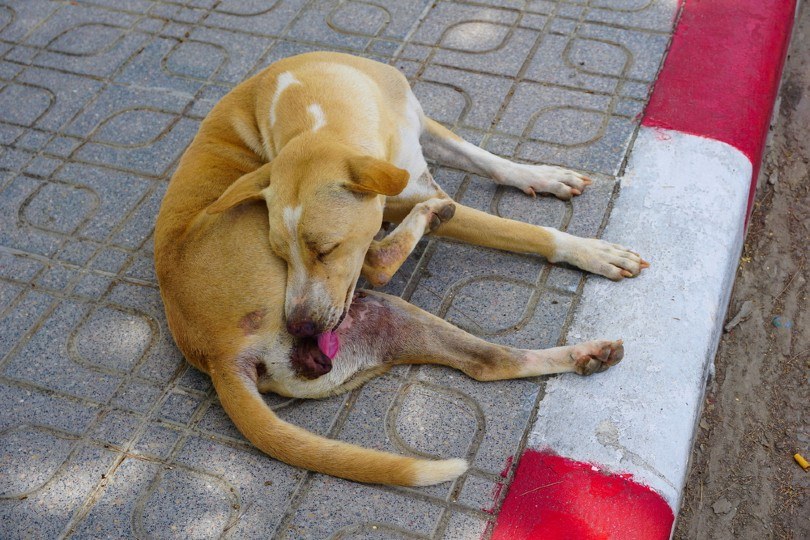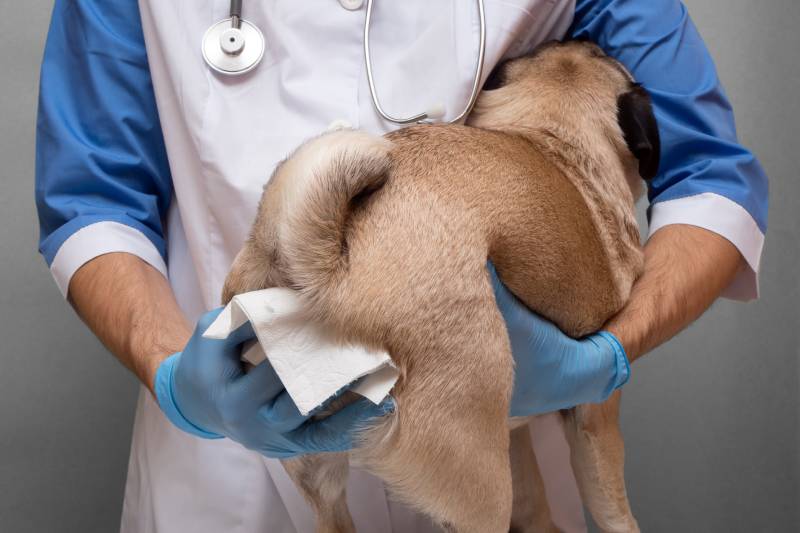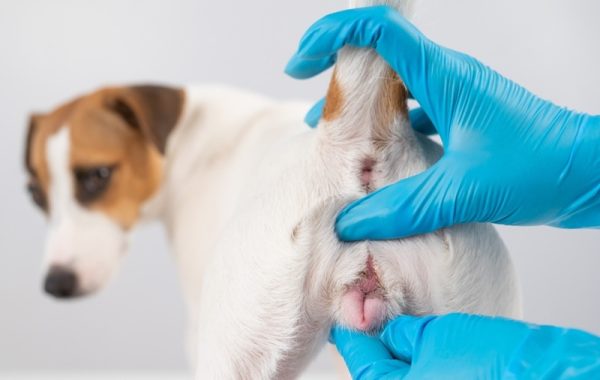Click to Skip Ahead
Vaginitis is a condition that all female dogs can experience in their lifetime. The underlying causes of vaginitis can be difficult to diagnose, and it may be challenging to recognize clinical signs associated with this condition. Intact and altered female dogs are susceptible to the development of vaginitis. Continue reading to learn more about vaginitis in dogs.

What Is Vaginitis?
Vaginitis is the inflammation of the vagina and/or the vestibule, the lower portions of the reproductive tract. Vaginitis can occur in all female dogs regardless of age and reproductive status. Inflammation can occur in the vagina for a variety of reasons, from growths to urinary incontinence.
What Are the Signs of Vaginitis?
- Discharge from the vulva
- Excessive licking/grooming of the vulva
- Frequent urination
- Scooting
- Straining to urinate
- Inflammation of the skin surrounding the vulva
- Attracting the attention of male dogs
What Are the Causes of Vaginitis?

As mentioned, there are a lot of different reasons vaginitis occurs. Very uncommonly, vaginitis is caused by a primary bacterial infection. Although primary bacterial infections are uncommon, the normal bacteria found in the vagina can ramp up if recent antibiotics have been administered, leading to a bacterial imbalance. Some cases of vaginitis are considered idiopathic, meaning there is not an identifiable underlying cause. Below are some possible causes of vaginitis development in dogs:
- Trauma from recent mating, birth
- Foreign body within the vagina
- Physical abnormalities like double vagina, ectopic ureters, persistent hymen, etc
- Urinary tract infections
- Herpes infection
- Decreased estrogen
- Urine pooling
How Is Vaginitis Diagnosed?
If you have suspicion that your dog may be experiencing problems due to observed clinical signs, you should schedule an appointment with your veterinarian. Your veterinarian will perform a physical examination on your dog and will discuss diagnostics.
Physical Exam
Often, dogs with vaginitis will experience discharge from the vulva that is white or yellow in coloration. The vulva may also appear inflamed due to ongoing irritation from licking or scooting. Patients rarely show signs of systemic illness. Clinical signs and history are often supportive of vaginitis.
Urinalysis
A urinalysis may also be used as a way of ruling in or out a urinary tract infection. It is helpful to obtain a urine sample by cystocentesis instead of a voided sample. A cystocentesis sample of urine is obtained directly from the bladder with a needle and syringe. If urine pulled from the bladder shows bacteria, it can be trusted, as there have not been opportunities for contamination. Bacterial contamination of urine can occur during the voiding process when urine meets normal bacteria living within the vagina.

Cytology
A swab may be obtained from the vagina and the cells can be evaluated under the microscope. In vaginitis, there will be an increased amount of white blood cells present and often bacteria as well. Again, it is critical to note that bacteria presence in the vagina is normal, but increased numbers of bacteria may be suggestive of vaginitis.
It is important to know if the patient is intact and if the patient has recently gone through a heat cycle, as this can influence how the results are interpreted.
Further Testing
Additional tests may be recommended to determine the underlying causes of vaginitis. For instance, scoping may be done to evaluate for the presence of a mass. An ultrasound might be helpful in showing an ectopic ureter.

How Do I Care for a Dog With Vaginitis?
The first step in being able to care for a dog with vaginitis is going to be identifying the underlying cause. Once the underlying cause has been found, proper treatment options will be discussed. Examples of treatment options may be surgical correction of a physical abnormality or potentially estrogen supplementation if the problem is linked to low hormone levels.
Care should be taken to closely monitor your dog for signs of recurrence, which may include excessive licking, increased urgency to urinate, and discharge from the vulva, along with others. If these signs are noted, it is important to schedule an appointment with your veterinarian.
If your veterinarian feels that your dog is uncomfortable, anti-inflammatories and pain medications may be prescribed. There may also be a benefit to administering probiotics.
It is important that the vulva remains clean and free of debris. Ensuring that the vulva is clean can help prevent secondary bacterial infections.
Hepper's Wash Wipes</a></strong> because they're effective on dirt and odors but also gentle on the skin. These USA-made premium wipes are safe for dogs of any age and contain hypoallergenic, moisturizing ingredients.</p>
<p><span style="font-size: 14px; color: #999999;"><em>At Dogster, we’ve admired Hepper for many years, and decided to take a controlling ownership interest so that we could benefit from the outstanding products of this cool pet company!</em></span></p>
</div>"}" data-sheets-userformat="{"2":12736,"9":1,"10":1,"11":4,"15":"\"Helvetica Neue\"","16":8}">
Whether your dog needs a quick refresh or cleanup of a sensitive area, pet-safe wet wipes are a convenient option. We recommend Hepper's Wash Wipes because they're effective on dirt and odors but also gentle on the skin. These USA-made premium wipes are safe for dogs of any age and contain hypoallergenic, moisturizing ingredients. At Dogster, we’ve admired Hepper for many years, and decided to take a controlling ownership interest so that we could benefit from the outstanding products of this cool pet company!
Puppy Vaginitis
Puppy vaginitis is a common occurrence in young female dogs. This is typically seen in dogs less than 1 year of age and can resolve on its own. Resolution typically occurs after the first heat cycle. Although vaginitis in young dogs is not uncommon, other diagnostics, like a urinalysis, will likely be done to ensure that your puppy isn’t battling something more serious.
Frequently Asked Questions
Should all dogs experiencing vaginitis be placed on antibiotics?
No! Most dogs will not need antibiotics for treatment. Unnecessary use of antibiotics may lead to problems.
Will my dog have recurring episodes of vaginitis?
It really depends on the underlying cause of vaginitis. Dogs with a physical abnormality that has led to vaginitis will likely continue having reoccurrence until the problem is corrected. A dog with a foreign body that has it appropriately removed will likely not go on to have recurrence of vaginitis.


In Conclusion
Vaginitis occurs in intact and spayed female dogs. Although common, treatment for vaginitis can be complicated, as it is dependent on the underlying cause. Identifying the cause enables clinical improvement through correct treatment. Improper use of antibiotics can further worsen problems in dogs and should be avoided. A veterinarian can help guide pet owners through recommended diagnostics and supportive care.
See Also:
- 17 Common Dog Reproductive Problems: Vet Reviewed Signs & Treatments
- Vaginal Discharge in Dogs: Our Vet Discusses Signs, Causes & Treatment
Featured Image Credit: Reshetnikov_art, Shutterstock












